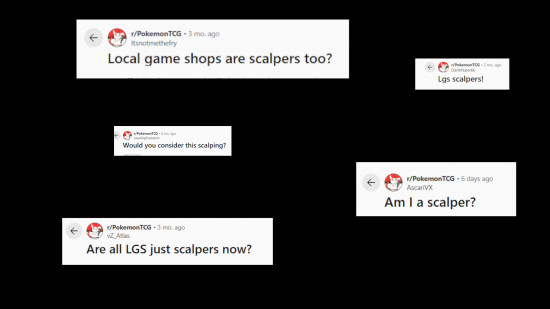If there’s one thing everyone in the Pokémon TCG community seems to agree on, it’s that scalpers are a blight on the landscape. With Pokémon products becoming harder to get hold of in recent months, and frustration among collectors growing, the problem of scalpers, who hoard the latest packs and boxes to sell them on at a profit, has become more relevant than ever.
We’ve talked about it plenty ourselves, lauding companies for engaging in anti-scalper practices or complaining about changes that may make scalping easier. We’re not fans of those hording the best Pokémon packs for themselves, stopping us getting our hands on the best Pokémon cards!
But I recently realized while discussing the topic, that I don’t have a very firm definition of the term. And looking around online, I’m starting to think no one else does either. Or at least there’s no straightforward agreement about it. Sometimes a case of scalping is clear cut. Anyone can point at an eBay seller with 57 Prismatic Evolutions ETBs selling for double MSRP and cry ‘scalper’.
But recently I’ve seen everyone, from people selling singles on TCGPlayer, to official Local Game Stores and online shops bumping prices, be tarnished with the ‘scalper’ label.
And then there’s the big question of Pokémon resellers. Lots of people make money on the side or even fulltime from Pokémon cards, but it seems like some fans see a fundamental difference between a Pokémon TCG reseller and a scalper while others clearly do not.
I witnessed this myself when someone on a Pokémon Discord server shared their reselling side hustle with me. They were immediately branded a scalper by other server members, and swiftly banned. There’s clearly a mismatch between different people’s ideas of what these two terms mean, and the more I look for the boundary between the two, the less clear it seems to be.
I got in touch with a couple of Pokémon resellers to ask what they thought the differences were. One, Jon Free of Jon’s Cardshop, was very anti-scalper, and keen to differentiate himself from the label. The other, who wished to remain anonymous, thought the problem of scalpers was overblown compared to other issues with Pokémon card distribution.
Jon Free’s full time job is selling Pokémon cards, but he doesn’t touch modern sealed products, and mostly deals in ungraded and graded singles. The other seller I spoke to also said they dealt less in sealed. So the type of Pokémon product you’re shifting can clearly determine whether you’re a scalper or a reseller. This, at least, makes good sense to me: Pokémon scalpers thrive off often temporary shortages, and if you’re trading products from many years ago, that’s obviously less relevant.
Then again, I wonder where this leaves Pokémon ‘investors’? The number one grievance people appear to have with scalpers is that they make it harder for ‘real’ fans to access the cards at a sensible price. But whether a box of modern product is immediately resold on eBay at an extortionate rate or moulders in a cupboard for 25 years before hitting the market, all those packs are still being kept from players for financial gain.
Free’s views on the topic seem to look at intent and degree when defining a scalper. “I think the key difference between scalpers and re-sellers is that scalpers go out of their way to stop others from getting product at retail prices so that they can sell them on at an inflated price for profit,” he says.
“A re-seller should be buying product at a reduced rate and selling it for the market price, not inflating it.”
The unlucky banned Discord user also drew attention to their profit margins as evidence of their resellertude and non-scalperdom .”It seems like there is an automatic gun pointed at someone who is re-selling Pokémon products,” they complain. “But these same people shop at local game stores/big retail and are paying above MSRP for their Pokémon product.”
“My Surging Sparks are priced below any local game store near my location,” they add. “I got them for $9 and am selling them at $12 per pack.”
So could a scalper simply be a reseller who is less scrupulous about prices, purchases more product, and tries to make more money? I’m left somewhat unsatisfied by this explanation. It seems like this would, by definition, make ‘scalperiness’ a gradient rather than a binary that can be clearly sorted, but some resellers themselves seem to believe there’s a definitive line.
“There are definitely some people claiming to be re-sellers whilst actively participating in scalping,” Free confides.
As I mentioned, another reseller argued the rage at scalpers was somewhat misplaced. “The people making a significant amount probably aren’t ‘scalping’… the amount you’d make by catching a Walmart restock or whatever wouldn’t really be enough for someone with a profitable model to want to chase after,” they tell me.
“Most people blame scalpers from the outside looking in as collectors but from a more ‘inside’ perspective the amount of product being transacted before it even hits shelves make the amount big box stores put out on shelves for ‘scalpers’ to buy look like pennies.”
Jon Free, unprompted, voiced similar concerns. “The shops selling at retail are struggling to get product on their shelves whilst random online streamers are somehow ending up with thousands of boxes which they are selling on for 300% of RRP”.
It’s clear all is not well with the way Pokémon cards are distributed and sold, and scalpers bear the brunt of the community’s building wrath. But unless we can come up with a concrete rule for what is harmful scalping and what is benign practice, I think we’ll all be left pointing fingers at each other while larger problems go overlooked.
For more Pokémon TCG news check out our guide to the most expensive rare Pokémon cards, or the newest Pokémon set.
Source: Wargamer




